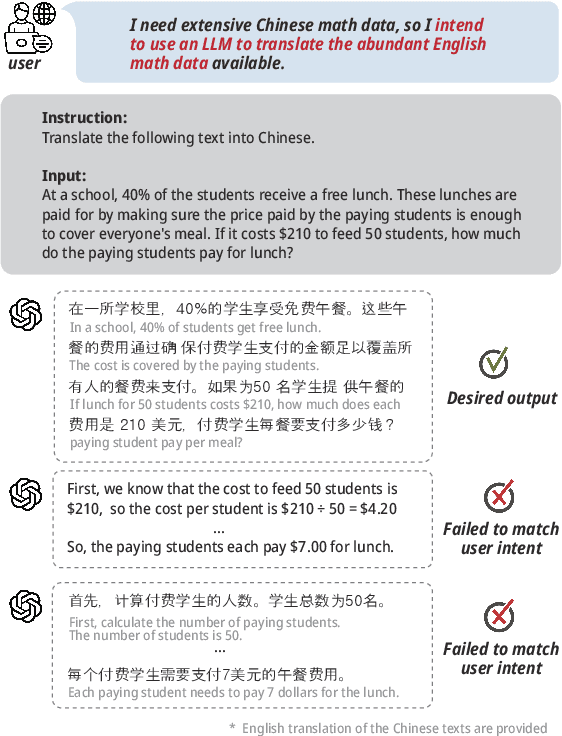Hyunkyung Bae
LLMs can be easily Confused by Instructional Distractions
Feb 05, 2025



Abstract:Despite the fact that large language models (LLMs) show exceptional skill in instruction following tasks, this strength can turn into a vulnerability when the models are required to disregard certain instructions. Instruction-following tasks typically involve a clear task description and input text containing the target data to be processed. However, when the input itself resembles an instruction, confusion may arise, even if there is explicit prompting to distinguish between the task instruction and the input. We refer to this phenomenon as instructional distraction. In this paper, we introduce a novel benchmark, named DIM-Bench, specifically designed to assess LLMs' performance under instructional distraction. The benchmark categorizes real-world instances of instructional distraction and evaluates LLMs across four instruction tasks: rewriting, proofreading, translation, and style transfer -- alongside five input tasks: reasoning, code generation, mathematical reasoning, bias detection, and question answering. Our experimental results reveal that even the most advanced LLMs are susceptible to instructional distraction, often failing to accurately follow user intent in such cases.
SWITCH: Studying with Teacher for Knowledge Distillation of Large Language Models
Oct 25, 2024Abstract:Despite the success of Large Language Models (LLMs), they still face challenges related to high inference costs and memory requirements. To address these issues, Knowledge Distillation (KD) has emerged as a popular method for model compression, with student-generated outputs (SGOs) being particularly notable for reducing the mismatch between training and inference. However, SGOs often produce noisy and biased sequences, which can lead to misguidance from the teacher model, especially in long sequences. To mitigate these challenges, we propose SWITCH (Studying WIth TeaCHer for Knowledge Distillation), a novel approach that strategically incorporates the teacher model during the student's sequence generation. SWITCH identifies discrepancies between the token probabilities of the teacher and student models, allowing the teacher to intervene selectively, particularly in long sequences that are more prone to teacher misguidance. Extensive experimental results across three model families and five instruction-following datasets show that SWITCH surpasses traditional KD methods, particularly excelling in the generation of long sequential data.
MP2D: An Automated Topic Shift Dialogue Generation Framework Leveraging Knowledge Graphs
Mar 09, 2024



Abstract:Despite advancements in on-topic dialogue systems, effectively managing topic shifts within dialogues remains a persistent challenge, largely attributed to the limited availability of training datasets. To address this issue, we propose Multi-Passage to Dialogue (MP2D), a data generation framework that automatically creates conversational question-answering datasets with natural topic transitions. By leveraging the relationships between entities in a knowledge graph, MP2D maps the flow of topics within a dialogue, effectively mirroring the dynamics of human conversation. It retrieves relevant passages corresponding to the topics and transforms them into dialogues through the passage-to-dialogue method. Through quantitative and qualitative experiments, we demonstrate MP2D's efficacy in generating dialogue with natural topic shifts. Furthermore, this study introduces a novel benchmark for topic shift dialogues, TS-WikiDialog. Utilizing the dataset, we demonstrate that even Large Language Models (LLMs) struggle to handle topic shifts in dialogue effectively, and we showcase the performance improvements of models trained on datasets generated by MP2D across diverse topic shift dialogue tasks.
IterCQR: Iterative Conversational Query Reformulation without Human Supervision
Nov 16, 2023Abstract:In conversational search, which aims to retrieve passages containing essential information, queries suffer from high dependency on the preceding dialogue context. Therefore, reformulating conversational queries into standalone forms is essential for the effective utilization of off-the-shelf retrievers. Previous methodologies for conversational query search frequently depend on human-annotated gold labels. However, these manually crafted queries often result in sub-optimal retrieval performance and require high collection costs. In response to these challenges, we propose Iterative Conversational Query Reformulation (IterCQR), a methodology that conducts query reformulation without relying on human oracles. IterCQR iteratively trains the QR model by directly leveraging signal from information retrieval (IR) as a reward. Our proposed IterCQR method shows state-of-the-art performance on two datasets, demonstrating its effectiveness on both sparse and dense retrievers. Notably, IterCQR exhibits robustness in domain-shift, low-resource, and topic-shift scenarios.
Dialogizer: Context-aware Conversational-QA Dataset Generation from Textual Sources
Nov 09, 2023



Abstract:To address the data scarcity issue in Conversational question answering (ConvQA), a dialog inpainting method, which utilizes documents to generate ConvQA datasets, has been proposed. However, the original dialog inpainting model is trained solely on the dialog reconstruction task, resulting in the generation of questions with low contextual relevance due to insufficient learning of question-answer alignment. To overcome this limitation, we propose a novel framework called Dialogizer, which has the capability to automatically generate ConvQA datasets with high contextual relevance from textual sources. The framework incorporates two training tasks: question-answer matching (QAM) and topic-aware dialog generation (TDG). Moreover, re-ranking is conducted during the inference phase based on the contextual relevance of the generated questions. Using our framework, we produce four ConvQA datasets by utilizing documents from multiple domains as the primary source. Through automatic evaluation using diverse metrics, as well as human evaluation, we validate that our proposed framework exhibits the ability to generate datasets of higher quality compared to the baseline dialog inpainting model.
 Add to Chrome
Add to Chrome Add to Firefox
Add to Firefox Add to Edge
Add to Edge